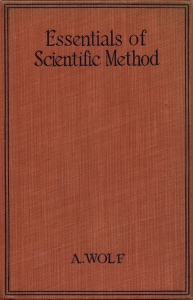LSE’s philosophical activities and affiliations go back a long way. Bertrand Russell himself served as School governor from as early as 1901 and actually taught here in 1896 (one year after the School’s foundation) – though it was a course on German social democracy.
However, the foundation stone for LSE Philosophy was really laid by Abraham Wolf with his course on Logic and Scientific Method – first mentioned in the 1905/6 Calendar.1
Wolf, described by the Aristotelian Society as a “a historian of ideas and of science”, was a former rabbi of the Manchester Reform Synagogue who had settled on more secular concerns with a joint Fellowship in Logic and Scientific Method, later to become a Professorship, at UCL and LSE.
Wolf’s Logic and Scientific Method course ran from 1905/6 to 1940/1 and was initially billed as “a general course of sixty lectures preparatory to sociological studies”.
Wolf’s amazingly long-lived course continued through his promotion to Professor in 1921, beyond his retirement in 1941 and, in spirit at least, right up to some of the courses we teach today.
 Logic and Scientific Method was not a degree subject in its own right – named subject degrees as we now know them would not be conferred by the School for some years to come – but was instead listed as an optional course for all students on the BSc (Econ), at that time the School’s primary degree. If you’d like to get a taste for Edwardian logic and scientific method then why not try your hand at the 1908 exam paper! Or don’t.
Logic and Scientific Method was not a degree subject in its own right – named subject degrees as we now know them would not be conferred by the School for some years to come – but was instead listed as an optional course for all students on the BSc (Econ), at that time the School’s primary degree. If you’d like to get a taste for Edwardian logic and scientific method then why not try your hand at the 1908 exam paper! Or don’t.
As well as Logic and Scientific Method, Wolf taught courses on psychology (e.g. in 1912/3), the history of philosophy (e.g. in 1917/8 & 1921/2) and a course on “recent British contributions to philosophy” in 1931/2.
Although Wolf was the only permanent representative of the “prehistoric Department”, other visiting and guest lecturers do crop up in the records. Amongst them are J. S. Fulton, who co-taught logic for a year in 1928/9 before returning to Balliol College, Oxford, and H. Wildon Carr, who taught a course on the philosophy of Henri Bergson in 1913/4 (though we try not to mention this to current faculty!)
Following Wolf’s retirement in 1941, the war-time flux experienced by the School led to a brief philosophical hiatus. This was brought to an end with the arrival of Karl Popper in 1946 and the birth of LSE Philosophy proper. Wolf passed away 2 years later, in 1948.
Notes
[1] The LSE Calendar contains definitive statements of all of the School’s programme regulations and course syllabuses and has been in publication since the School’s foundation. Early copies of the Calendars also included complete staff listings as well as the Director’s annual report.



Connect with us
Facebook
Twitter
Youtube
Flickr